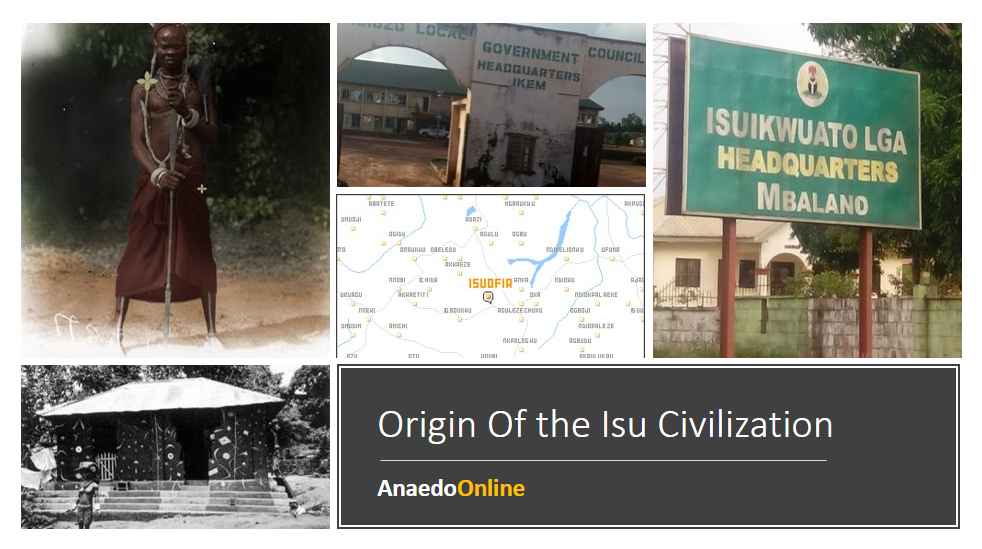Origin of Isu Settlements: Nnewi’s Role in Isu Civilization
The Isu people, believed to originate from Isuama in Imo State, consider Nnewi a crucial hub of Isu civilization and culture. Nnewi holds a prominent position in the oral narratives of the Isu community, marking it as a pivotal center for their cultural and historical identity. However, the dynamics shifted with the decline of the Eri people and the rise of Nri hegemony. Nnewi, formerly known as Isu Agbaja, played a crucial role in the Isu story. The emergence of Nri priestcraft marked a turning point, sparking competition with the Aro for priestly supremacy. Within Isu Agbaja, a faction, aligned with the local guild of blacksmiths, collaborated with the Aro, orchestrating a military takeover that led to the replacement of Nri’s priest-kingship with a political monarchy, known as Igwe, still in power today. The guild of blacksmiths, led by Okwaraeshi, faced expulsion and resettled in lands granted by Amaigbo, evolving into Nkwerre.
This period also witnessed the dispersal of the Isu people, driven in part by the barren and infertile soil in their native area, limiting agricultural productivity and population sustainability. Excelling in trade and servitude, the Isu migrated south into Upland Rivers territories, offering their services as laborers and hired farmers. This journey earned them the moniker Isu-akamma, later corrupted to Isoma, a term used by neighboring communities such as Owerri, Ohaji, Egbema, Agwa, Etche, and Ikwerre to refer to Isu people or anyone from the hinterland. The dispersed forested formations in which Isu settlements existed led to biases from Owerri and Aro communities, viewing the Isu as ‘nde ime ohia’ or bush people.
The intricate Isu heritage unfolds further as we discover that Isu communities are not confined to standalone towns or local government areas. Within the larger framework of towns, there exist vibrant Isu settlements, like the Umuenems in Otolo Nnewi and the Akaborji in Uruagu Nnewi. These areas, while not explicitly bearing the Isu prefix or existing as independent towns or local government areas, harbor a profound understanding of their ancestral ties to the Isu people. The presence of Isu lineage within villages under a town or towns under a state exemplifies the nuanced nature of Isu identity, demonstrating that the thread of their cultural heritage weaves through diverse layers of community structure.
Isu-Cuba Connections
Reviving Unity and Brotherhood
Read Also: Ugochinyere Urges Imo REC To Investigate Magic Figures’ At Isu, Ideato South, Others
An Isu Day for History and Heritage
Notable Isu Settlements Across Igboland
- Isuofia: Located in Anambra State, Isuofia is renowned as the hometown of notable individuals like Governor Soludo.
- Isuikwuato: Isuikwuato, situated in Abia State, is a local government area with a name that holds historical significance. The term “Isu-Ikwu-Ato” translating to ‘three Isu families or lineages.’ refers to the three distinct lineages descended from the Isu people, encompassing the area that now constitutes the local government. The three brothers central to this lineage are Imenyi, the eldest, followed by Oguduasaa, his younger sibling from the same mother, and Isuamawo, the second oldest and the first from the second wife. This naming tradition reflects the rich heritage and familial ties embedded in the history of Isu People.
- Isuochi: Situated in Abia State, Isuochi is another town with the “Isu” prefix, and it is known for its cultural, historical contributions and skills, which remained distinct with them especially in traditional arts and crafts industries. These artisans are resourceful and productive and are now almost self-sufficient people..
- Isu-Njaba: Found in Isu LGA in Imo State, Isu-Njaba is part of the Isu clan in Igboland.
- Isu Uzo: Situated in Enugu State, Isu Uzo is part of the Isu community, contributing to the cultural diversity of the region.
-
Isuokoma: Isuokoma stands as a prominent clan in Onicha Local Government Area (LGA) within Ebonyi State. Functioning as the administrative headquarters of Onicha LGA, it holds the distinction of being arguably the most significant voting population in Ebonyi state. Situated strategically, Isuokoma shares borders with Nara Unateze in Enugu state, Ishielu LGA, and Uburu in Ohaozara LGA, all within Ebonyi state. Notably, Isuokoma plays a crucial role in the agricultural landscape, contributing to the production of substantial quantities of rice, cassava, yams, palm oil, and various other agricultural products.
- Ibguzo-Isu (“Igbo bi n’ụzọ”): Nestled in Delta State, Ibguzo-Isu also known as Ibuzo stands as a testament to the widespread influence of Isu towns. Known by the moniker “igbouzo fu ogu ju nri,” translating to “Igbuzor that refused food at the sight of war”, this community exemplifies remarkable bravery and resilience. During the Ekumeku uprising against British colonialists in (1883–1914), the Igbuzos played a pivotal role, contributing significantly to the war effort and inflicting substantial casualties on the British forces.
These towns, among others, share a commonality in their names, indicating a historical connection and potentially a shared ancestry. The presence of the “Isu” prefix often signifies a link to the broader Isu community in Igboland.
Post Disclaimer
The opinions, beliefs and viewpoints expressed by the author and forum participants on this website do not necessarily reflect the opinions, beliefs and viewpoints of Anaedo Online or official policies of the Anaedo Online.

